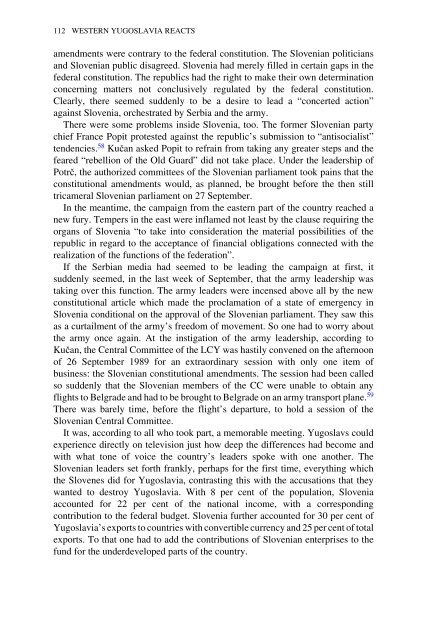Yugoslavia: A History of its Demise - Indymedia
Yugoslavia: A History of its Demise - Indymedia
Yugoslavia: A History of its Demise - Indymedia
Create successful ePaper yourself
Turn your PDF publications into a flip-book with our unique Google optimized e-Paper software.
112 WESTERN YUGOSLAVIA REACTS<br />
amendments were contrary to the federal constitution. The Slovenian politicians<br />
and Slovenian public disagreed. Slovenia had merely filled in certain gaps in the<br />
federal constitution. The republics had the right to make their own determination<br />
concerning matters not conclusively regulated by the federal constitution.<br />
Clearly, there seemed suddenly to be a desire to lead a “concerted action”<br />
against Slovenia, orchestrated by Serbia and the army.<br />
There were some problems inside Slovenia, too. The former Slovenian party<br />
chief France Popit protested against the republic’s submission to “antisocialist”<br />
tendencies. 58 Kučan asked Popit to refrain from taking any greater steps and the<br />
feared “rebellion <strong>of</strong> the Old Guard” did not take place. Under the leadership <strong>of</strong><br />
Potrč, the authorized committees <strong>of</strong> the Slovenian parliament took pains that the<br />
constitutional amendments would, as planned, be brought before the then still<br />
tricameral Slovenian parliament on 27 September.<br />
In the meantime, the campaign from the eastern part <strong>of</strong> the country reached a<br />
new fury. Tempers in the east were inflamed not least by the clause requiring the<br />
organs <strong>of</strong> Slovenia “to take into consideration the material possibilities <strong>of</strong> the<br />
republic in regard to the acceptance <strong>of</strong> financial obligations connected with the<br />
realization <strong>of</strong> the functions <strong>of</strong> the federation”.<br />
If the Serbian media had seemed to be leading the campaign at first, it<br />
suddenly seemed, in the last week <strong>of</strong> September, that the army leadership was<br />
taking over this function. The army leaders were incensed above all by the new<br />
constitutional article which made the proclamation <strong>of</strong> a state <strong>of</strong> emergency in<br />
Slovenia conditional on the approval <strong>of</strong> the Slovenian parliament. They saw this<br />
as a curtailment <strong>of</strong> the army’s freedom <strong>of</strong> movement. So one had to worry about<br />
the army once again. At the instigation <strong>of</strong> the army leadership, according to<br />
Kučan, the Central Committee <strong>of</strong> the LCY was hastily convened on the afternoon<br />
<strong>of</strong> 26 September 1989 for an extraordinary session with only one item <strong>of</strong><br />
business: the Slovenian constitutional amendments. The session had been called<br />
so suddenly that the Slovenian members <strong>of</strong> the CC were unable to obtain any<br />
flights to Belgrade and had to be brought to Belgrade on an army transport plane. 59<br />
There was barely time, before the flight’s departure, to hold a session <strong>of</strong> the<br />
Slovenian Central Committee.<br />
It was, according to all who took part, a memorable meeting. Yugoslavs could<br />
experience directly on television just how deep the differences had become and<br />
with what tone <strong>of</strong> voice the country’s leaders spoke with one another. The<br />
Slovenian leaders set forth frankly, perhaps for the first time, everything which<br />
the Slovenes did for <strong>Yugoslavia</strong>, contrasting this with the accusations that they<br />
wanted to destroy <strong>Yugoslavia</strong>. With 8 per cent <strong>of</strong> the population, Slovenia<br />
accounted for 22 per cent <strong>of</strong> the national income, with a corresponding<br />
contribution to the federal budget. Slovenia further accounted for 30 per cent <strong>of</strong><br />
<strong>Yugoslavia</strong>’s exports to countries with convertible currency and 25 per cent <strong>of</strong> total<br />
exports. To that one had to add the contributions <strong>of</strong> Slovenian enterprises to the<br />
fund for the underdeveloped parts <strong>of</strong> the country.
















